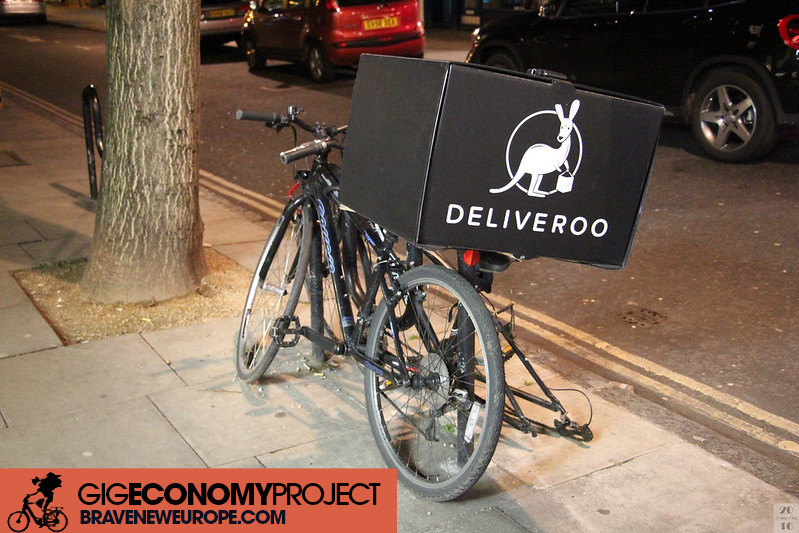The first criminal trial of a food delivery platform in France delivered a historic judgement.

The Gig Economy Project, led by Ben Wray, was initiated by BRAVE NEW EUROPE enabling us to provide analysis, updates, ideas, and reports from all across Europe on the Gig Economy. If you have information or ideas to share, please contact Ben on GEP@Braveneweurope.com.
This series of articles concerning the Gig Economy in Europe is made possible thanks to the generous support of the Andrew Wainwright Reform Trust.

The President of the Paris Criminal Court ruled on Tuesday [19 April] that Deliveroo was guilty of “the offence of concealed work”, meaning they should have been hiring their riders as employees rather than on a self-employed basis.
The judge punished the UK company with the maximum financial penalty possible, €375,000, and told the firm that they must display the verdict on the front of their website and app for one month.
Two former managing directors were also sentenced to a 12 month suspended prison-sentence, a €30,000 fine each and a five year suspended ban on running a company. A third executive was found to be an accomplice and given a four-month suspended sentence, and a €10,000 fine.
The company, part-owned by Amazon, also has to pay €50,000 in compensation to five trade unions, as well as between €1,200-3,000 to the more than 100 riders who worked for Deliveroo between 2015 to 2017, the period in which Deliveroo was under investigation, and made up the civil parties in the trial.
As a result of the verdict, URSSAF, the French government body responsible for collecting social security contributions, is demanding €9.7 million from Deliveroo in unpaid tax payments which are paid by companies per employee.
The trial, had been brought forward by over 100 Deliveroo riders represented by a coalition of groups, including the Collective of Autonomous Platform Delivery Workers (CLAP), who the Gig Economy Project spoke to in February. It was the first criminal trial of a food delivery platform in France, a country which has seen conflicting verdicts from courts over the question of employment status for platform workers. This verdict, which is in line with the majority of verdicts across Europe, could prove decisive in that respect.
Following the verdict, Jerome Pimot from CLAP stated: “This judgment sends a very strong message to Deliveroo, to the other platforms but also to all the deliverers who have been fooled by this system. It is also a strong message for politicians who love innovation without seeing the damage.”
Deliveroo stated that they “categorically contest this judgment, which we consider incomprehensible. We will appeal and continue to invest in France.”
Deliveroo pulled out of the Spanish market last year after the “rider’s law” came into force, which established a presumption of employment for Spanish food delivery workers.
READ MORE: Lora Verheecke: Take care platform workers, France is president of the EU Council
French President Emmanuel Macron, battling to win the final round of the presidential election which takes place this Sunday [24 April], has been a consistent advocate of the gig economy and has resisted calls for platform workers to be treated as employees. Under his presidency, food delivery workers have been under the status of “micro-entrepreneurs”, a work category celebrated by the platforms but bemoaned by unions as an attack on workers’ rights.
Macron is currently the president of the EU Council (a position that rotates every six months) as the body decides whether it wants to amend the European Commission’s platform work directive proposals, published in December, which proposed employment status as the default option for platform workers. It has been widely rumoured that the French President will use his position on the EU Council to seek to water down the platform work Directive, and when Nicolas Schmit, the EU Commissioner responsible for the Directive, was asked about Macron meddling with the reform, he merely replied: “I hope not…”.
The Deliveroo trial, which took place from March 8-16, heard the prosecution criticise the absence of Will Shu, Deliveroo CEO, from proceedings, arguing that he was the one who benefits from “all the advantages of the employer…without the disadvantages”.
Deliveroo was accused of a “systemic concealment” of employment, a “fraud” which had the sole purpose of hiring riders “at a lower cost”, and evidenced various ways in which Deliveroo controls the work process to prove that there was indeed a relationship of subordination between the rider and the company which amount to an employee relationship.
Riders gave evidence at the trial, explaining that they were attracted by promises of work “freedom” and “flexibility” but what they experienced was a “war” to get the best delivery slots and constant “surveillance” and “pressure from the company.
The defence claimed that there was not “any relationship of subordination” and that Deliveroo merely acted as a means of connecting together customers, restaurants and riders.
To sign up to the Gig Economy Project’s weekly newsletter, which provides up-to-date analysis and reports on everything that’s happening in the gig economy in Europe, leave your email here.
Support us and become part of a media that takes responsibility for society
BRAVE NEW EUROPE is a not-for-profit educational platform for economics, politics, and climate change that brings authors at the cutting edge of progressive thought together with activists and others with articles like this. If you would like to support our work and want to see more writing free of state or corporate media bias and free of charge. To maintain the impetus and impartiality we need fresh funds every month. Three hundred donors, giving £5 or 5 euros a month would bring us close to £1,500 monthly, which is enough to keep us ticking over.


Be the first to comment